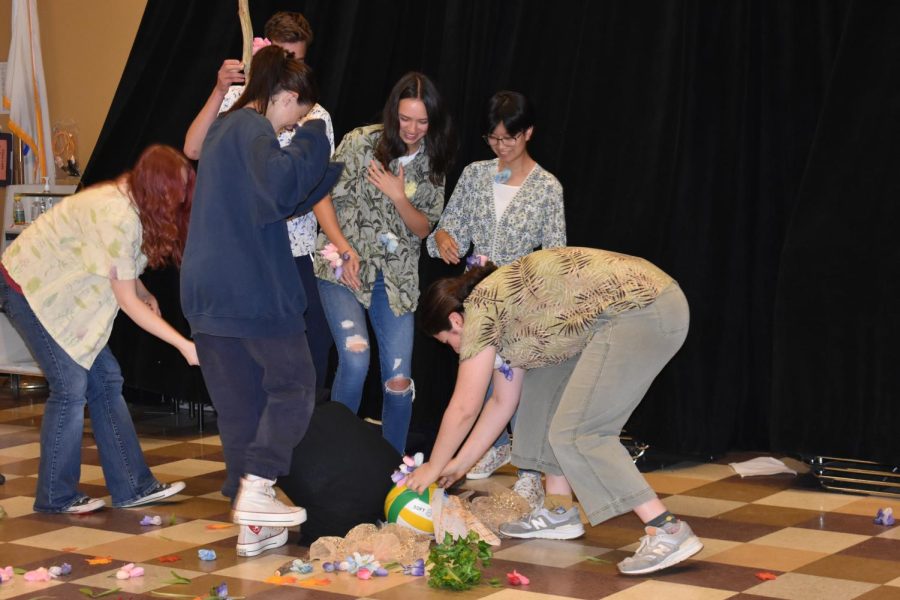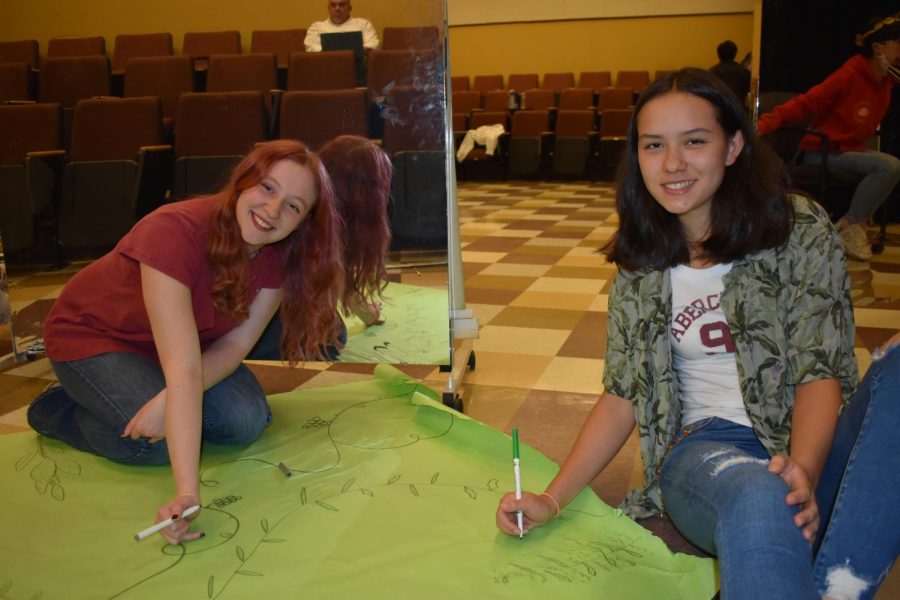“The Bacchae:” A modern take on classical literature
Credit: Aimee Smith
The Bacchae (juniors Abby Wrentmore, Bronwyn Keenan, Ben Caddoo, Kally Proctor, Jaden Kane and Bethany Foreman) kill King Pentheus. Foreman plays King Pentheus’ mother, who doesn’t realize that she is killing her son.
June 9, 2023
On June 8, the Honors Classical Literature class performed its rendition of “The Bacchae ” by Euripedes during second and third lunches. Instead of a typical end of year essay, the Honors Classical Literature class rewrote a classic play to perform for the school.
To start the project, each student presented a potential play and the whole class voted on the one that they would reenact. While some plays such as “The Birds” and “The Clouds” were contenders, the class ultimately chose the Greek tragedy, “The Bacchae.” While rewriting the play for a modern audience, the class decided to take a more humorous approach.
“When you take the plot of ‘The Bacchae’, it’s ruthless and kind of gross, to be honest,” junior Abby Wrentmore said. “But we added our own twist on it and made things a little bit more comedic. When we were writing, we specifically mirrored “Monty Python’s” style [of humor], so that there was room for humor in an otherwise dark play.”
During the rewriting process, the class split the play into six scenes which were then assigned to different writers. According to Wrentmore, who edited the first draft of the play, writing was the most difficult part. Wrentmore spent around six hours making the play sound more cohesive, and believes that condensing the plot made her focus on the parts of the play that were essential to the story.
“[The process of play writing] is a lot different from the process of writing an analytical essay, because you’re acting it out,” Wrentmore said. “You’re saying the words, you’re making the motions and you’re watching an otherwise written out story unfold, which is pretty cool.”
While creating a play allows some students to think about classical literature from a new perspective, that wasn’t Classical Literature teacher Edmund DeHoratius’s only goal when assigning the project.
“One of the benefits of the project is to get [students] used to the idea that [the deadline] is fixed,” DeHoratius said. “[I tell them that] we have to put on the play, it’s happening. Enjoy it, it won’t be perfect, and that’s fine, too.”
According to play director and actor junior Bethany Foreman, the time constraints are one of the more difficult parts of the project.
“Because I don’t have enough time to [explain to] people, ‘This is where you are, then you move this,’ before each scene, I tell people where they’re blocking and just say go,” Foreman said. “This way, I see everyone’s creative sides pop out.”
Acting isn’t the only creative opportunity in “The Bacchae.” Students also designed and created their own props. For example, the class made a prop scarecrow of King Pentheus out of sticks. They also used a volleyball to replace the actor, junior Carlin Gruber, in the scene where King Pentheus is killed by his mother.
Because the play requires a large amount of attention to detail, according to Foreman, the project has required a lot of collaboration amongst students.
“I’ve gotten closer with some of my classmates whom I never talked to [before], because I work with them now,” Foreman said. “I’d never worked with Ben Caddoo before because he sits in a different row than me, but since he’s one of the secondary actors, I work with him a lot. Small things like that make class feel whole.”
While putting on a play was a new experience for some people in the class, it was a creative way to share classical literature with the rest of the school.
“It’s more fun to perform and show how passionate we are about classical literature [through a play] than another essay,” Foreman said. “Because then other people in the audience get to enjoy it too.”





![Last Wednesday, the Wayland School Committee gathered to discuss a number of topics regarding the health curriculum and Innovation Career Pathway course. Another large topic of conversation was the ways to potentially mitigate distracting cell phone usage. "These [phones] are going to distract your learning and social relationships," Superintendent David Fleishman said. "That's concrete right there."](https://waylandstudentpress.com/wp-content/uploads/2025/06/Screenshot-2025-06-04-at-9.49.31 PM-1200x886.png)



























![Troy Hoyt finishes the Boston Marathon, running for the Hoyt Foundation. T. Hoyt is the son of Hoyt Foundation CEO Russ Hoyt.
“[Running a marathon] might seem like a big thing, when it’s presented to you at first, but if you break it up and just keep telling yourself, “Yes, you can,” you can start chipping away at it. And before you know it, you’ll be running the whole 26 miles, and you won’t even think twice about it.” T. Hoyt said.](https://waylandstudentpress.com/wp-content/uploads/2025/04/C36E8761-1CBB-452E-9DF2-543EF7B1095E_1_105_c.jpeg)














































